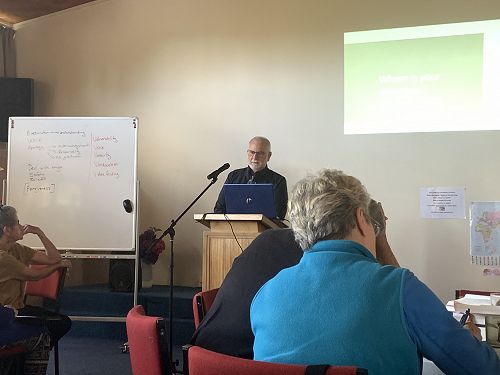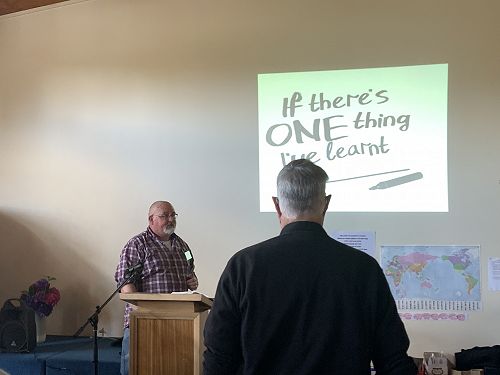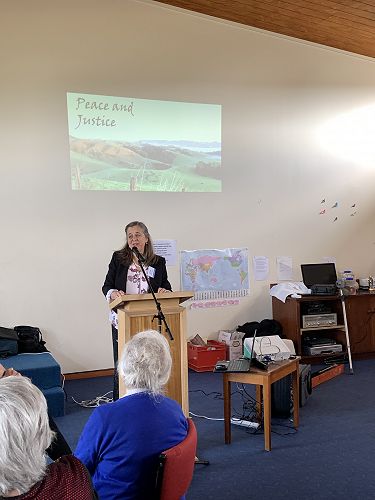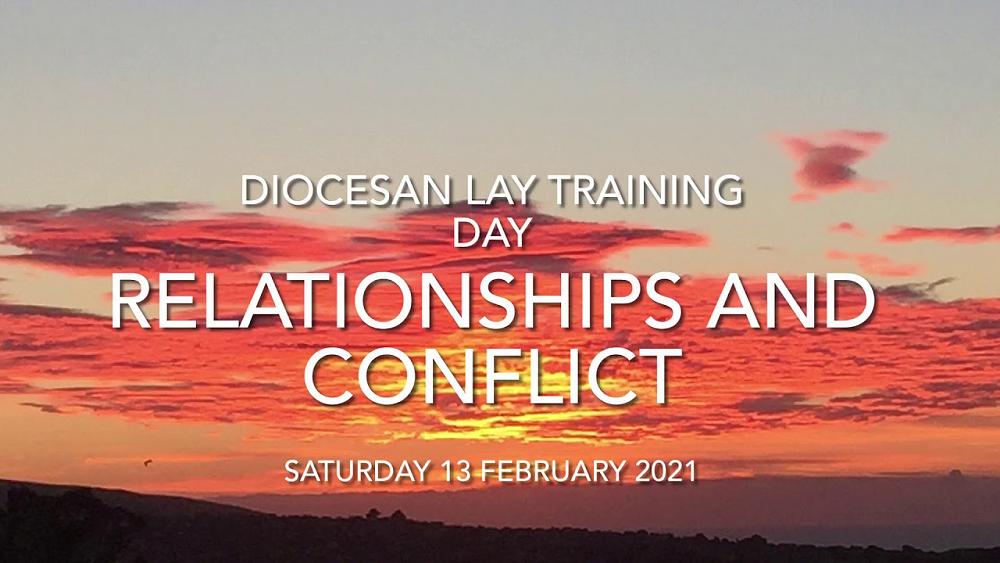Diocesan Training Day: Relationships and Conflict
On Saturday 13 February around 80 people from all corners of the Diocese joined in a training day for Lay Ministers and others involved in local ministry held at St Mark’s Balclutha. Read on for part one of a report on this event...
We were welcomed by Rev’d Brett Roberts, who encouraged us to pray for the Parish there… something that we need to continue to do as we place each other and our communities in God’s care.
Justice and Peace

Rev’d Dr Anne Van Gend started the day off which had a theme of Conflict and Relationships. She spoke about the concept of Shalom, where everything is in right relationship with each other – a peace and satisfaction. Shalom is also about webbing together God, people and creation in justice, fulfillment and delight – a broad understanding of everything and everyone in right relationship with everything and everyone else. In a world which increasingly focuses on “it’s all about you”, a rising disconnection is taking place. We see this in NZ with young people feeling more disconnected.
The peace that we talk about (and live) is a peace with God and creation, but hooks into a whole lot of unformed longings that point towards God. This kind of longing is something that everyone feels, but may not necessarily make the connection as being a “homesickness” for God. The West is suffering with terrible loneliness, and as people of faith we need to be confident of offering something into this: the Good News of God, the piece of the puzzle that brings everything together.
Anne spoke of the building of Shalom as a priority, and asked the group, if we feel wronged or injured, what do we really long for? It usually has to do with being deeply listened to, acknowledged, feeling safe and being believed, wanting the balance restored and taken from a place of disempowerment to one of dignity and mana restored. We don’t just need to vent – but feel that something has truely been turned around.
Chris Marshall’s work on restorative justice is worth considering when thinking about restorative justice – bringing a change when conflict has destroyed peace. This focuses on: taking care of the vulnerable, making sure they feel safe; allowing their story to be told, heard and believed; gaining a sense of vindication, having feelings justified and; finding the value of going through this process – if I have gone through this, it will be better for others.
Justice in the Bible is different to our more Western concepts of this. Rather than being about blame and retribution, it is described in terms of a powerful, flowing river (Amos 4), something that heals and restores, bringing about peace. Law is really about sustained Shalom, with restoration being hard work (easier in many ways to go to jail!). Anne reminded us that righteousness is all about doing justice to bring about peace. It's something that is active, relational and covenantal (living rightly and justly). Time and time again in the Old Testament God says that what’s always required is for us to live up to and into this covenant – I want justice from you, but you are heading towards calamity.
Time and time again in the New Testament Jesus talks about Peace, often offering this in difficult situations. Jesus, God’s new covenant with all of creation, won’t be broken – he is our peace, for all of us who were once separated and far off. This is our challenge to bring about this heaven on earth through restoring relationships, being part of this huge river of justice and love.
Techniques for Dealing with Tricky Situations
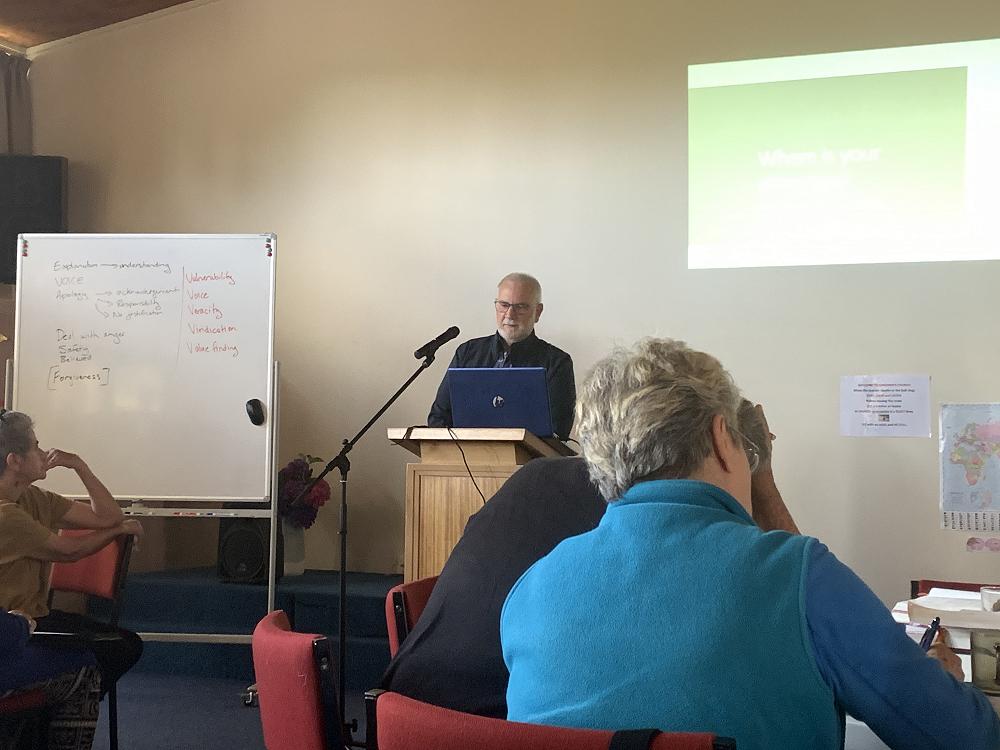
Bishop Kelvin then followed up with a session looking at dealing with tricky situations. Kelvin’s first words were “We are the body of Christ…” which everyone present automatically responded with “by one spirit we were baptized into one body”. Something many of us know off by heart, but when we look at what can go in in our lives and in our faith communities, we can show a loss of attention, being caught up in trivialities instead. He gave a story of a trip in an old VW combi-van years ago, which had a full load of whanau in the back. When something happened to the distributor, which required a spare one to be put on in the dark and the points re-set, all by torch light… the problems started. The full focus on attention of the torch needed to be on the distributor, but it kept on being commandeered by others in the van for other less important tasks.
Our attention should be on being the body of Christ, the redeemed ones and all that that means… we get captured by other things. Kelvin encouraged us if we were in spaces that were tricky to refocus our attention onto the really important things. This means we need to ask ourselves where our attention really is, what are the voices that compete for attention. If disputes arise, we need to ask: where is the attention of everyone else involved in this issue?
Kelvin prescribed some very sound practices that all of us can do to maintain our focus. All of us can develop a regular rhythm of spiritual practice that puts in a place where we can truly live as Christ wants us to… plus really be the Body of Christ.
Another technique Kelvin commended was that of listening to the stories of others. The stories that people tell often reflect deeper concerns and issues, even though they may not articulate these directly. They “leak out” of a story.
Stories have different levels: Firstly, the data – this is what I do, or what I’m interested in (imagine a group of male acquaintances talking about sport, cars or other things). The next level will talk more about feelings “out there” (a bit riskier), and the one after that about data/feelings someone is experiencing now. The final and deepest level is that of self disclosure…and this is the space that Jesus is calling us to, that level where change and transformation is able to happen, not just continuing to be caught up in the peripheral stuff.
Story telling by others tends to fall into four main types:
1. A transition story (usually indicating the person is going through some kind of transition themselves). They have a pattern of something ending, a time of confusion and disquiet, followed by a new beginning. “Our old car we loved, but it became irreparable, we were looking for a new one but nothing was right, we were getting to the point of despair. Then we found the one we got now, it’s great and we are really happy with it”.
2. The I know someone who… story can be one where an issue we are facing is displaced onto someone else, the story teller is actually speaking autobiographically.
3. An anniversary story – one that gets told every anniversary of an event that caused great loss, bereavement or anxiety. They have a sense of a fear for the future, and people can re-live their pain every year (or even more often than this).
4. A rehearsal story – one that is repeated over and over again: one that indicates that there must be a reason for telling the story, and often has major life themes that have become part of someone’s journey.
The combination of our own spiritual practice (having our attention in the right spaces) and listening intently to the stories people tell us (recognising that they will leak out deeper concerns that we can gently ask about) is one important way to be able to deal with tricky situations and people. It helps us to focus on what really needs our attention and helps us to bring the loving presence of God to everyone we meet.

Next edition of Ko Te Tonga kei te Karaka – more about the training day, looking at interpersonal conflict and mediation, follow this link
Gallery
